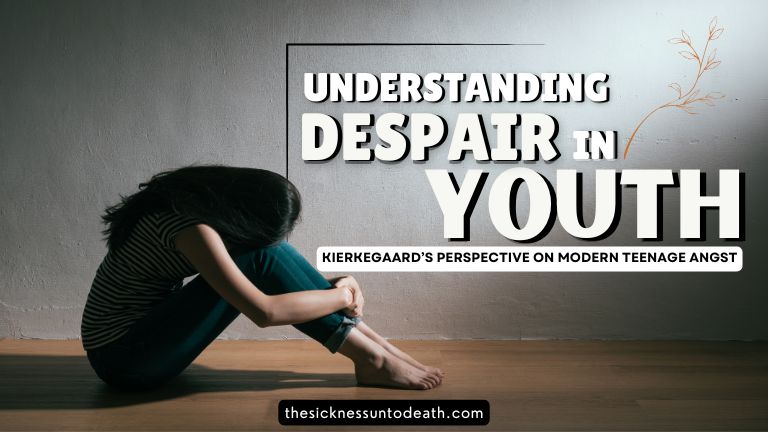In an era where teenage angst often headlines news regarding mental health, Kierkegaard’s profound insights into the nature of despair provide a compelling lens to understand these modern challenges. Although written in the 19th century, Kierkegaard’s work, especially his discussions on despair in “The Sickness Unto Death,” offers timeless perspectives that can help us navigate the complexities of today’s youth mental health crisis.
Kierkegaard on Despair
For Kierkegaard, despair was not just a passing mood but a profound misalignment of the self. He described it as a failure to integrate the finite and infinite aspects of our nature, leading to a state of disconnection from one’s true identity. In today’s terms, this could be seen as the conflict between who we are and who we feel pressured to be—a prevalent issue in the formative years of teenagers and young adults.
The Impact of Social Media
One of the most significant modern contributors to teenage despair is the pervasive influence of social media. Platforms that curate flawless personas can lead young people to constantly measure their ordinary lives against these idealised presentations, often feeling that they fall short. This digital comparison trap can spiral into feelings of inadequacy and despair, precisely the kind Kierkegaard identifies as being toxic to our authentic self.
Pressure to Perform
Today’s youth face immense pressures: excelling academically, fitting in socially, and making pivotal life decisions prematurely. Kierkegaard believed that despair often stems from not choosing oneself wholeheartedly – that is, not embracing one’s true path but conforming to external expectations. This pressure can lead to a disconnect from one’s own desires and capabilities, fostering a sense of despair.
Lorem ipsum dolor sit amet, consectetur adipiscing elit. Ut elit tellus, luctus nec ullamcorper mattis, pulvinar dapibus leo.
Navigating Despair through Self-Understanding
Kierkegaard advocates for a journey towards self-understanding as a remedy for despair. This path involves embracing one’s complexities and contradictions and understanding that true identity is not a fixed state but a continuous process of becoming. Encouraging teenagers to explore and accept their authentic selves can counteract the despair born from feeling inadequate or inauthentic.
Practical Steps for Parents and Educators
- Promote Open Dialogues: Creating environments where young people can express their fears and aspirations without judgment can help them sort through their feelings and reduce feelings of isolation.
- Encourage Authentic Pursuits: Help teenagers engage in activities that align with their genuine interests, rather than what might look impressive on a college application or social media.
- Teach Critical Thinking about Media: Equip young people with the tools to critically assess the images and messages they encounter on social media and other platforms to mitigate the impact of unrealistic standards.
- Model Authenticity: Adults can model behaviour by showing that they too, grapple with insecurities and uncertainties, demonstrating that these feelings are a normal part of the human experience.
- Support Personal Reflection: Encourage practices like journaling or mindfulness, which can help young people develop a deeper connection with their internal world.
By understanding Kierkegaard’s insights on despair, we can better support our youth in navigating the challenges of modern life. His philosophy prompts us to look beyond superficial fixes and to address the root causes of despair – often found in the disconnection from one’s authentic self. In doing so, we not only help alleviate the immediate symptoms of teenage angst but also guide them towards a more fulfilling and authentic life.

